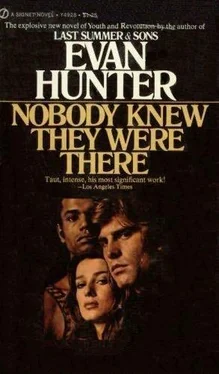Evan Hunter - Nobody Knew They Were There
Здесь есть возможность читать онлайн «Evan Hunter - Nobody Knew They Were There» весь текст электронной книги совершенно бесплатно (целиком полную версию без сокращений). В некоторых случаях можно слушать аудио, скачать через торрент в формате fb2 и присутствует краткое содержание. Город: New York, Год выпуска: 1971, ISBN: 1971, Издательство: Doubleday & Company, Жанр: Проза, на английском языке. Описание произведения, (предисловие) а так же отзывы посетителей доступны на портале библиотеки ЛибКат.
- Название:Nobody Knew They Were There
- Автор:
- Издательство:Doubleday & Company
- Жанр:
- Год:1971
- Город:New York
- ISBN:978-0094575004
- Рейтинг книги:4 / 5. Голосов: 1
-
Избранное:Добавить в избранное
- Отзывы:
-
Ваша оценка:
- 80
- 1
- 2
- 3
- 4
- 5
Nobody Knew They Were There: краткое содержание, описание и аннотация
Предлагаем к чтению аннотацию, описание, краткое содержание или предисловие (зависит от того, что написал сам автор книги «Nobody Knew They Were There»). Если вы не нашли необходимую информацию о книге — напишите в комментариях, мы постараемся отыскать её.
Nobody Knew They Were There — читать онлайн бесплатно полную книгу (весь текст) целиком
Ниже представлен текст книги, разбитый по страницам. Система сохранения места последней прочитанной страницы, позволяет с удобством читать онлайн бесплатно книгу «Nobody Knew They Were There», без необходимости каждый раз заново искать на чём Вы остановились. Поставьте закладку, и сможете в любой момент перейти на страницу, на которой закончили чтение.
Интервал:
Закладка:
“Thought I’d never make it, eh, Bob?” she says to the boy in the cast.
“Get that damn thing off my leg,” he answers.
“Hello, Arthur,” she says, waggling her fingers at me. She scoops up the coat by its collar, twirling it about her legs like a bullfighter’s cape, the strands of beads flying out and away from her body simultaneously as she executes a neat swing toward the kitchen.
“Where’ve you been, Sara?” Seth calls to her.
“Oh, banking around,” she answers over her shoulder, “just banking around.”
Sara is here.
The party has begun.
I am saved.
She ignores me for the rest of the night.
She dances with every man in the room, and even tries to coax Bob to get up and hobble around with her on his encased leg, but he flatly refuses, shaking his shaggy head, though he is grinning in his beard from ear to ear. She dances smoothly and gracefully, executing steps she undoubtedly learned in her cradle, steps I have never had the courage to try on a dance floor, steps that seem the exclusive property of the young. I am sharply aware all at once of the vast difference in our ages and terrified that she will approach me next and urge me onto the floor. But she does not. She ignores me thoroughly and completely, and I wonder why she asked Seth to invite me, and then wonder whether she really did. She drinks steadily and heavily, but as she once warned me, she does not get drunk. At one point, she asks if we have all seen Seth’s bedroom (I feel a twinge of jealousy, recalling her tale of the night they necked and talked) and then asks us to wait a minute, and then goes out through the kitchen and into the bedroom, and then comes back and says, “All right, everybody, it’s ready now,” and leads two or three of the guests away with her, coming back to stare at me and say, “Don’t you want to come, Arthur?” and holding out her hand to me and pulling me off the piano bench and then taking us all into Seth’s bedroom, where she flicks off the lights. I am the only one who knows where he is supposed to look, but obstinately I will not.
“Don’t you see it?” she says to the others. “The ceiling. Look up at the ceiling. There are luminous little stars on the ceiling.”
Everyone looks up at the ceiling. Everyone is wondering how Sara knows there are luminous little stars on Seth’s bedroom ceiling.
“Aren’t they lovely?” She says. “I love shining little stars.” She looks up with a phony beatific smile on her face. “I had to come in first to turn on the lights for a few minutes. So the stars would shine when I turned them off again. Aren’t they gorgeous?”
“Gorgeous,” I say, and she turns on the lights.
There is a picture of Martin Luther King on Seth’s dresser. The walls are hung with bric-a-brac and souvenirs, picture postcards, scraps cut from magazines and newspapers, caricatures of Seth and of the bearded boy Bob, a poster announcing a play written by Seth and performed by the University of Wisconsin in the spring of last year, the ancient Esquire photograph of a glowering Sonny Liston with the words black power lettered beneath it directly onto the wall, a dungaree jacket on a hook, a crutch on another hook, several train schedules, a calendar, a glossy photograph of a white girl laughing and obviously high and wearing no blouse, a list of things to do next week (blank) and another list of things already done (marked with Chapter Ten, Chapter Eleven, Chapter Twelve, all crossed out), a Catholic scapula tacked to the wall and dangling from its brown strings, alongside of which, also tacked to the wall, are a set of rosary beads and a Jewish mezuzah. The walls, in my estimation, are far more interesting than the goddamn ceiling with its gorgeous luminous stars.
She is gone again.
She has left something on the porch outside, and she goes to get it now, tracking in a flurry of leaves in her wake. She holds a huge pumpkin in her extended hands, bright orange against the black of her sweater and slacks. She puts it into the center of the living-room floor and then goes into the kitchen for newspapers and carving knives, spreading the papers carefully, setting the pumpkin down on them, and then passing out the knives and inviting people to carve the pumpkin because All Hallows’ Eve is only five days away. She glances at me. There is something strange in her eyes. She is wearing her contacts, and her eyes are dark, I cannot read what is in them, I do not know what she is trying to say to me. Her attention is caught by the music on the turntable, a song unfamiliar to me but one she obviously knows well. She leaves the pumpkin carvers, who are scattering seeds and pulp onto the newspapers, and stretches out on the couch and dreamily listens to the song, and then sits upright suddenly, and knowing that I am the only person watching her, slowly and deliberately reaches down to pick up a solitary leaf from the floor. She examines it for a moment, and then puts it into the back pocket of her slacks. She looks at me, and turns away.
Slowly and deliberately, I reach down to pick up another leaf. Slowly and deliberately, I put it into my back pocket. She seems about to cry. Our eyes hold. I am reminded of the meeting in Hester’s office, when neither Hester nor I would turn away. Sara and I seem incapable of performing this simple task now, but I know it is she who will turn away first, and I wait, but still she does not turn, and finally she says, “You carve the mouth, Arthur. Make a smiling mouth, Arthur. You never smile.”
“I smile.”
“No,” she says. “Never.”
The party is breaking up.
In couples or alone, the guests are beginning to depart. The smiling pumpkin (it is Seth who finally carves the mouth), illuminated now with a single glowing votive candle, sits in the uncurtained window facing the black street outside. My follower has left with Lucille. Epstein, sitting in the same easy chair, is apparently telling Adele about yet another woman he knew abroad, rambling on drunkenly about Connie and the cellar near Rouen, “feared day and night,” he is saying, “feared it might have to come off,” making about as much sense as Koblenz who is explaining his Beztlos-Playboy theory to yet another stranger in the kitchen, while Jean Trench snipes at him and courts another beating. The music drones on, but someone has had the good grace to lower the volume. Sara sits on the couch under the picture of W. C. Fields. (Someone is explaining that the still photo was taken from a film called My Little Chickadee, and that Fields's line in answer to the question “Is this a game of chance, sir?” was “No, not the way I play it.” I remember the line. I saw the film when I was eight years old. To Sara, that is during the time of the American Renaissance.) Epstein, finally stirring himself from reveries of La Belle France, says it’s time he was going, and offers me a lift back to the hotel. Sara sits up.
“Can you drop me, too?” she asks.
We look at each other.
In the automobile, we are silent. Epstein drives slowly and carefully over the snow-covered streets. The town is deserted. The windshield is coated with rime. (I can recall the gondola moving to the top of Sugarbush, the rime on the plastic, and my son Adam revealing his plans to me. “Total recall is a curse,” Sara once told me.) She says nothing now.
When we reach the hotel, I get out, and Sara asks Epstein to let her out here, too. She feels like walking home, she says, she feels like a little fresh air. He is concerned for her safety. It is two o’clock in the morning. She assures him that she will be all right, and steps onto the sidewalk beside me. Together, we watch the car go off into the night, a blue exhaust puffing from its tailpipe.
Читать дальшеИнтервал:
Закладка:
Похожие книги на «Nobody Knew They Were There»
Представляем Вашему вниманию похожие книги на «Nobody Knew They Were There» списком для выбора. Мы отобрали схожую по названию и смыслу литературу в надежде предоставить читателям больше вариантов отыскать новые, интересные, ещё непрочитанные произведения.
Обсуждение, отзывы о книге «Nobody Knew They Were There» и просто собственные мнения читателей. Оставьте ваши комментарии, напишите, что Вы думаете о произведении, его смысле или главных героях. Укажите что конкретно понравилось, а что нет, и почему Вы так считаете.












